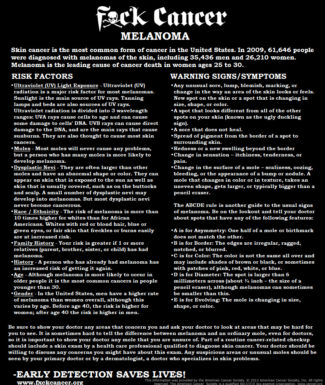Prevention
Too often, doctors detect cancer late stage, which lowers the chance of any intervention being effective. Since we haven’t yet found a cure, early detection and preventative measures are vital.
Through our efforts at Fuck Cancer, we raise awareness about the importance of cancer screenings as well as ways to keep the disease from taking lives. Getting screened, living a healthy lifestyle and educating yourself about signs that something might be wrong can increase survival rates or eliminate the disease altogether. Cancer is not something we should take lightly; it’s time to start making our health a priority.
What Exactly is Cancer?
It’s one of the worst diseases imaginable.
But technically, it’s a collection of over 100 diseases that form when the body’s cells begin dividing uncontrollably. Your body makes new cells constantly, it’s how you’re able to grow and develop, but cancer takes new cell growth to a different level entirely.

Unlike healthy cells, which develop for a specific region in your body, cancer cells don’t give a shit about an intended purpose and continue to divide for no reason at all. Eventually, cancer cells may form a solid tumor capable of spreading to other parts of the body, depending on whether it’s benign or malignant.
Every type of cancer responds differently to the body, but it can still take a life if it’s left undetected. Cancer will even block your immune system — your body’s natural defense mechanism — from killing the abnormal cells. It’s one of the most manipulative diseases in existence, and we need to stop it.
Right Now, Prevention is the Best Weapon
Because there’s no cure, the next best initiative is to keep cancer from invading at all. Taking action now while you’re still healthy is the most effective preventative measure.
You can keep many forms of cancer at bay through a healthy lifestyle. Exercising regularly, eating right, reducing your intake of alcohol and tobacco, and using sun protection can all reduce the health issues you experience later on in life.
Don’t Believe Us?
Back in 2008, over 500,000 people died from cancer, and the American Cancer Society estimates that 170,000 of these deaths were caused by tobacco use, bad eating habits, obesity and a lack of exercise. We get it; change is hard, but when it comes to your quality of life, adjusting your lifestyle is more important than ever.
Cancer Prevention
Acute Lymphocytic Leukemia
Bladder Cancer
Brain Cancer
Breast Cancer
Cervical Cancer
Chronic Leukemia Cancer
Colorectal Cancer
Endometrial Cancer
Esophageal Cancer
Hodgkin Lymphoma
Kidney Cancer
Liver Cancer
Lung Cancer
Melanoma

Now What?
1. Get A Screening
Once you’ve got your health into check, it’s time to schedule regular cancer screenings. This is especially important for those who have family members with the disease. If there’s any chance that cancer may run in your family, preventative health screenings with your physician are crucial.
You can learn about whether you are predisposed to cancer through genetic testing; talk to your family doctor about checking whether a cancer diagnosis could be in your future. Research shows that screenings for cervical or colorectal cancer can prevent the disease by detecting precancerous lesions. Screenings for breast cancer are also effective at detecting the disease when it’s in a highly treatable stage.
The purpose of a cancer screening is to detect the disease in its earlier stages, which gives health professionals more time to develop a treatment plan.
Screenings save lives and increase chances of survival. Even at your healthiest, you should receive annual screenings and stay updated on the status of your health.
2. Vaccines
Other proactive measures you can take are seeking out vaccines that can reduce your risk of a cancer diagnosis. The human papillomavirus (HPV) vaccine, for example, has proven to prevent cervical, vaginal and vulvar cancers, while the vaccine for hepatitis B can reduce your risk of liver cancer.
3. Preventative Health
It’s these treatments that should be made accessible to everyone, but unfortunately are only available to a select few. For this reason, we raise awareness in our community about reducing risks of cancer and locating the resources available to you. Talk to your doctor about the ways you can become active in preventative health, and be sure to spread the message about the importance of early detection.
